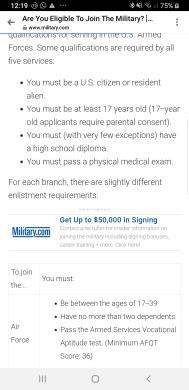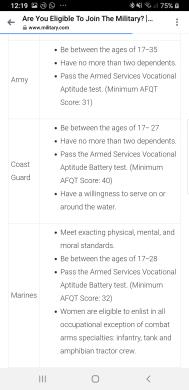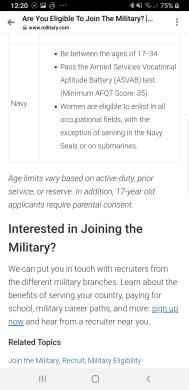60% of US Blacks don't qualify for US Armed Forces. (AFQT-ASAVB test)
Race differences in Armed Services Vocational Aptitude Battery (ASVAB):
40% of black AFQT candidates, or 60% of US general black population, don't qualify for US Armed Forces
A large percentage of Blacks are considered not trainable as efficient soldiers, due to low IQ.
The US Armed Forces still try to hire the Best, according to scientifically developed criteria. But they have to keep a low profile about such "racist" selection by IQ.
Higher ranks, unfortunately, suffer either from affirmative promotion, or, when not a "minority", from mandatorty PC attitude
The Education Trust study shows wide disparities in scores among white and minority students. Nearly 40 percent of black students and 30 percent of Hispanics don’t pass, compared with 16 percent of whites. [...][Source: Washingtontimes]
Recruits must score at least in the 31st percentile on the first stage of the three-hour test to get into the Army or the Marines. Air Force, Navy and Coast Guard recruits must have higher scores.
The average score for blacks is 38 and for Hispanics is 44, compared to whites’ average score of 55. The scores reflect the similar racial gaps on other standardized exams.
Scores are percentiles!
[...] The Education Trust study examined the scores of nearly 350,000 high school graduates ages 17 to 20 who took the ASVAB exam between 2004 and 2009. About half of the applicants went on to join the Army.
[Source: Washingtontimes]
From the Education Trust's report, Shut Out of the Military:
About 23 percent of the test-takers in our sample failed to achieve a 31 –the qualifying score–on the AFQT. Among white test-takers, 16 percent scored below the minimum score required by the Army. For Hispanic candidates, the rate of ineligibility was 29 percent. And for African-American youth, it was 39 percent.
23% of the AFAQ test takers score better than the 31st percentile of a nationally representative sample. That means the test takers are above average intelligence (or else 31% of test takers would score below the 31 percentile). 40% of test taking blacks don't qualify for the armed forces, and, as Steve Sailer calculated, 60% of the general Black population does not qualify.
That's the IQ ineligibility rate among non-obese, non-crooked, high school graduates who want to join the Army.
The AP story goes on:
The average score for blacks [in this self-selected sample of high school graduates wanting to join the Army] is 38[th percentile] and for Hispanics is 44, compared to whites' average score of 55. The scores reflect the similar racial gaps on other standardized exams. [Source: A Semi-Exception To The Fundamental Constant Of Sociology]
Qualifications required by Armed Forces
GED holders who earn 15 college credits 100 level or greater are considered equivalent with those holding high school diplomas, so that they need only the Tier I score to enlist. Eligibility is not determined by score alone. Certain recruiting goal practices may require an applicant to achieve a higher score than the required minimum AFQT score in order to be considered for enlistment. Rules and regulations change on a daily basis; applicants should call their local recruiting center for up to date qualification information.[3wikipedia] [4wikipedia]
Almost 100 Million People In America Aren't Smart Enough To Enlist In ... [Unz]
Note: this link has been deleted, such censorship is one reason we like to cite articles extensively isteve.blogspot.com/2013/04/almost-100-million-people-arent-smart.htm
The Pentagon isn't in any hurry to make its intelligence requirements explicable to the media. The conventional wisdom is that intelligence testing is a racist hoax or it just applies to academia, not the real world, or whatever. The fact that the military is obsessive about cognitive testing is something that simply isn't in the reigning worldview, and the military is fine with that. It likes testing and it dislikes outside interference, so the more convoluted its jargon for talking about its intelligence requirements, the better.
For example, the entrance exam is, in one sense, the ASVAB, a 9 or 10 part 3-hour test. But a 4-part subset of the ASVAB called the AFQT determines whether you'll be allowed to enlist or not. (The non-AFQT ASVAB subtests influence assignments, such as to vehicle repair.) […]
The AFQT is a verbal and math test kind of like the SAT or ACT. AFQT scores are so highly g-loaded that they are pretty much interchangeable with IQ scores on a non-culture free IQ test like the Wechsler, according to a retired head of psychometrics for one of the major branches of the armed forces whom I interviewed at length in 2004. Much of The Bell Curve was based on the military's AFQT data that was normalized on the 1979 National Longitudinal Study of Youth.
The Wikipedia article on the ASVAB gives the AFQT minimum scores to enlist as of December 2012:
AFQT scores are not raw scores, but rather percentile scores indicating how each examinee performed compared with all other examinees. Thus, someone who receives an AFQT of 55 scored better than 55 percent of all other examinees. Maximum possible score is 99 as a person can do better than 99 percent of those who took the test, but he cannot do better than himself, so the high percentile is 99.
[…] So, the lowest percentile you can get into the military with is the Marines at the 32nd percentile (if you have a high school diploma, plus the Marines have plenty of physical and other requirements). With 315 million residents in the country, 31% percent aren't smart enough to join the Marines, so that's over 97 million. […]
If you look around enough online you can find PDFs of statistical reports for the government that add even more insight. For example, the Congressional Research Service reported that the military branches have both quantity and quality goals in recruitment. The basic Department of Defense quality goals are that 90% of recruits have high school diplomas and 60% score above average on the AFQT (i.e., have a 3 digit IQ).
In FY 2011, all branches met their quantity goals and exceeded their quality goals. The Army had 99% high school graduates (i.e., not GEDs) with 63% scoring above average on the AFQT. [...]
So, 150 million people, maybe more, couldn't join the Air Force in 2011 because they aren't smart enough. [...]
The AFQT scores are normed versus the National Longitudinal Study of Youth 1997, the follow-up to the NLSY79 highlighted in The Bell Curve. [...]
In summary, every effective institution in America works hard to select better people. But, the fake "immigration debate" going on right now has ruled out all discussion of just what is the quality of illegal immigrants.
Moreover, we have a whole bunch of our fellow American citizens who aren't of the cognitive quality currently necessary to fight for their country. Shouldn't we be worrying more about what kind of living they'll be able to earn before we care about solving Mexico's problems? [complete article at Almost 100 Million People In America Aren't Smart Enough To Enlist In ... and Unz]
US Army creating IQ test for Iraqi Army recruits:
One of the least known but most decisive facts in the pseudo-controversy over the validity of IQ tests is that the U.S. military, after 88 years of intensively studied experience with giving IQ tests to tens of millions of potential recruits, remains utterly committed to using them. Indeed, since 1992, when the end of the Cold War and the destruction of Iraq, reduced the need for a giant standing army, only about one percent of all new enlisted personnel have gotten in with scores under the 30th percentile nationally on the military's entrance test. […]
The reason you haven't heard about this (besides the usual stifling of IQ discussions in the media) is because military hates the idea of lowering IQ standards. It has done an enormous amount of research on trainability by IQ, accidents by IQ, and the like and it knows low IQ soldiers aren't worth the expense and risk in a high tech military.[…]
Also, the much vaunted racial equality within the U.S. Army stems directly from the use of cognitive tests. As I wrote in VDARE.com a couple of years ago:
Professors Moskos and Sibley found in their 1994 book All That We Can Be: "83 percent of white recruits scored in the upper half of the mental aptitude test (compared with 61 percent of white youths in the national population), while 59 percent of black recruits scored in the upper half (compared with 14 percent of the black youths nationwide)."
In other words, the Army's black enlisted personnel score just as well on the general aptitude test as the average white American. (African-American officers average even better, of course.)
There are still differences, so whites tend to predominate in the most intellectually-challenging military jobs. Still, by drawing just from blacks with relatively high IQs, the Army has managed to sidestep a huge number of problems.
So the magic race relations bullet that the military has found turns out to be - IQ tests.
A reader sent me an article about the US wanting to devise a cognitive test for Iraqi army recruits. It comes from the expensive newsletter Inside the Army, along with his comment: "No [kidding], Sherlock ... of course, we can't even talk about this in the States, without winding up on the SPLC's list of racists."
SCREENING TEST BEING DRAWN UP FOR IRAQI ARMED FORCES RECRUITS
The U.S. Army and Iraqi Ministry of Defense want to devise a screening test for recruits to the new Iraqi armed forces, with an eye toward weeding out unsuitable recruits and possibly identifying those that may have leadership skills.
[Read complete article at US Army creating IQ test for Iraqi Army recruits:]
Average IQ of enlisted men
Following the latest John Kerry brouhaha, a reader asked what the average IQ of U.S. military personnel is. From table 2.8 of the is Department of Defense document, I estimate that the average for new enlisted men in 1998 was about 105.
This would be in the 60th to 65th percentile compared to all the young people in America when the Armed Forces Qualification Test was normalized in 1980 on the National Longitudinal Study of Youth's sample of 13,000 people ages 15-23. (This is the same enormous study that provides the data in Section 2 of The Bell Curve.)
Female enlistees would be similar.
The Air Force has the highest AFQT test score enlistees, with the Navy slightly ahead of the Army and Marines for second place.
[...] Some of the branches of the military have recently increased the percentage of "Category IV" recruits (between 11th and 30th percentiles), [...]
So, what is the average IQ of officers? I don't know much about today, but a military psychometrician told me that in the 1975-1985 period, the average SAT score (under the old, tougher scoring system) was 1001 in the Army, 1018 Marines, 1051 Air Force, and 1103 Navy.[...]
that would suggest about, oh, 113 to 121 for the average officer in the various services back in 1975-1985.
If you want to read all about officers' IQs, you can see my 2004 article comparing the IQs of Bush and Kerry based on how they did on officer qualification tests. [...]
The average for enlistees (male and female) in 1998 across all services would be about 107 for white enlistees, 102 for blacks, and 103 for Hispanics. (That shows the impressive patriotism of minorities who possess more options in life than the average. A little known fact is that the average black enlistee comes from a home with an income above the national average for blacks.)
In comparison, according to data kindly provided to me by Charles Murray, when the military renormalized the AFQT on a new nationally representative sample in 1997, white males averaged 102.7 and black males 88.4. [...]
Here's something you won't read elsewhere.
It's widely assumed that American minority soldiers are suffering a disproportionate number of deaths in the current war. Yet, according to iCasualites, 74% of all American fatal casualties in the Iraq war have been suffered by non-Hispanic whites. In 2004, non-Hispanic whites only made up 67% of the total population, and, more relevantly, only 61% of the 25-year-olds, which might be about the representative age of the fatalities.
So, young whites are dying in Iraq at a per capita rate more than 80% higher than young minorities. If you are wondering about how I calculated that, it's:
(74% / 61%) / (26% / 39%)
What you definitely won't see elsewhere is an explanation of the most likely reason for this racial imbalance: IQ. To be allowed to enlist, you have to score 92 or higher on the military's IQ test, the Armed Forces Qualification Test (the same one used throughout The Bell Curve.) Since 1992, only 1% of new military enlistees have had IQs below the 30th percentile nationally.
This requirement disqualifies about half of all Hispanics and over 60% of all blacks from joining up, versus less than a quarter of all whites.
People such as Harvard Professor Robert D. "Bowling Alone" Putnam like to talk about how the rest of society can attain the friendly racial relations found in the U.S. military:
“I think we can do a lot to push change along more rapidly. The US military is one example. There was a lot of racial tension around the time of the Vietnam war. Now, polls show that US military personnel have many more friendships across ethnic lines than civilians. And that was deliberate. If officers were told they wouldn’t make colonel if they were seen to discriminate, they changed.”
Okay, but even if we followed Dr. Putnam's implicit advice and imposed martial law on America, we still wouldn't be able to follow what is the secret to the military's success: artificially eliminate the majority of the racial IQ gap by using an IQ-based admissions test.
It's crucial to remember that, until very recently due to Iraq, three out of ten American youths, and a higher proportion of minority youths, were ineligible for service in the military due to low IQs. This means that the benefits of military acculturation are unavailable to those who presumably need them the most. Last year I proposed an alternative to military service for kids who think they could benefit from military discipline but aren't smart enough to pass the AFQT. [Read complete article at Average IQ of enlisted men]
IQ Denial Goes to War - American Renaissance
In a dissertation published in 2013, Amy Rutenberg points out that “[s]upporters of Project 100,000, most notably former Assistant Secretary of Labor Daniel Patrick Moynihan, saw the program as a savior for black men.”15 In his famous report on the “Negro Family,” Moynihan wrote that 67.5 percent of black men failed armed forces screening tests, depriving them of the opportunity to acquire marketable skills and the veterans’ benefits they could have enjoyed when they returned to civilian life.16 Later, in an article published in New Republic, “Moynihan argued that if African Americans served in the military in proportion to their numbers in the population and if the unemployment rate for young black men was correspondingly reduced, then ‘the unemployment rate for non-white males in the relevant age group [in 1964] would have been lower than that for whites.’”17
McNamara expressed similar views, stating in a 1967 speech that military service would give black men pride and release them from “the inner ghetto of the poverty-scarred personality.” Accordingly, “during the five years [Project100,000] lasted, an average of 40% of NSM [New Standards Men] were black. This figure contrasted sharply with the black 8% of the Service population. DOD [Department of Defense] certainly heeded Moynihan’s call to overrepresent black men in the Armed Forces.”18
Slate says blacks are dumber than average!
Well, to be precise, Congress banned the enlistment of anyone scoring below the 10th percentile back in the early 1950s because of documented trouble in training and accident prevention among people with IQs of 80 or less. In 1992, the military virtually stopped accepting new enlistees below the 30th percentile (IQs below 92, which is about half a standard deviation above the African-American median). Since the end of the Cold War, only 1% of new enlistees have scored below the 30th percentile.
Several career officers are dismayed by this new policy—not least because it reverses the progress that has been made these past two decades in the buildup of a professional army.
In the mid- to late-1970s—in the wake of the Vietnam War, the height of popular disenchantment with the military, and the start of the all-volunteer armed forces—as many as half of U.S. soldiers hadn't finished high school, and as many as one-third were Category IV.
One of the little-known reasons for the notoriously low quality of enlistees during the Carter Era was the "Misnorming" fiasco:
The first reason is sociopolitical. Not many nations have an all-volunteer army, and the concept could not be sustained if the burden of service fell entirely on the lowest classes—on those who joined the military because they couldn't find jobs elsewhere. The inequity would be intensified—rendered impossible to ignore—if the face of this lower-class army were disproportionately black. This was precisely the kind of military we had in the early days of the all-volunteer force: overwhelmingly poor, uneducated, and African-American. But this is no longer the case. The racial mix, reading levels, and aptitude scores of today's Army are not much different from those of 18-to-24-year-olds in American society as a whole. [Emphasis mine.]
[Source: Slate says blacks are dumber than average!]
Race Differences, Immigration, And The Twilight of the European Peoples
Blacks kill police
GED holders who earn 15 college credits 100 level or greater are considered equivalent with those holding high school diplomas, so that they need only the Tier I score to enlist. Eligibility is not determined by score alone. Certain recruiting goal practices may require an applicant to achieve a higher score than the required minimum AFQT score in order to be considered for enlistment. Rules and regulations change on a daily basis; applicants should call their local recruiting center for up to date qualification information.[3][4]
Are You Eligible To Join The Military? | Military.com
To join the.../p> | You must: |
Air Force |
|
Army |
|
Coast Guard |
|
Marines |
|
Navy |
|
Age limits vary based on active-duty, prior service, or reserve. In addition, 17-year old applicants require parental consent.
IInterested in Joining the Military?
[continue at Are You Eligible To Join The Military? | Military.com]
&
Minimum Required ASVAB Scores for Military Branches
Air Force ASVAB and Education Requirements Air Force recruits must score at least 36 points the 99-point ASVAB. The overall ASVAB score is known as the AFQT score, or Armed Forces Qualification Test score. Exceptions may be made, however, for a handful of high school graduates who can score as low as 31. The vast majority, some 70 percent, of those accepted for an Air Force enlistment achieve a score of 50 or above.
How the ASVAB Score Is Computed
AFQT
The AFQT is a combination of the four scores from the math and verbal domains, which consists of AR, MK, WK, and PC.
AFQT scores are reported as percentiles between 1-99. An AFQT percentile score indicates the percentage of examinees in a reference group that scored at or below that particular score. Thus, an AFQT score of 95 indicates that the examinee scored as well as or better than 95% of a nationally representative sample of 18- to 23-year-olds. An AFQT score of 60 indicates that the examinee scored as well as or better than 60% of the nationally representative sample.
23 percent can’t pass military exam
[...]“The classes need to be tougher because people aren’t learning enough,”Mr. Jackson said.
The unspoken, and false, presupposition is that all people have the mental and intellectual capacity to learn enough to pass the test.
See also Within Race differences
Swiss High Schools admit only brightest 20%. Average Students need not apply.
This is the first time ever that the U.S. Army has released this test data publicly, said Amy Wilkins with the Education Trust, a Washington-based children’s advocacy group. She said the organization worked with the U.S. Army to get raw data on test takers from the past five years.
“It’s really about illuminating the issue of whether our high schools are preparing young people to serve the country,” said Ms. Wilkins, vice president of the Education Trust. “It’s important for national security.”
The Education Trust study shows wide disparities in scores among white and minority students. Nearly 40 percent of black students and 30 percent of Hispanics don’t pass, compared with 16 percent of whites. [Source: 23 percent can’t pass military exam]
No wonder that the army resists releasing such racist data
Even those passing muster on the Armed Services Vocational Aptitude Battery, or ASVAB, usually aren’t getting scores high enough to snag the best jobs.
“A lot of times, schools have failed to step up and challenge these young people, thinking it didn’t really matter — they’ll straighten up when they get into the military,” said Kati Haycock, president of the Education Trust. “The military doesn’t think that way.”
Christina Theokas, the author of the study, said the test was updated in 2004 to reflect the current needs of the Army, and the Army didn’t want to release data from before the realignment.
Recruits must score at least in the 31st percentile on the first stage of the three-hour test to get into the Army or the Marines. Air Force, Navy and Coast Guard recruits must have higher scores.
The average score for blacks is 38 and for Hispanics is 44, compared to whites’ average score of 55. The scores reflect the similar racial gaps on other standardized exams.
Further tests determine what kind of job the recruit can do with questions on mechanical maintenance, accounting, word comprehension, mathematics and science.
The Education Trust study examined the scores of nearly 350,000 high school graduates ages 17 to 20 who took the ASVAB exam between 2004 and 2009. About half of the applicants went on to join the Army.
https://en.wikipedia.org/wiki/Armed_Services_Vocational_Aptitude_Battery
https://en.wikipedia.org/wiki/The_Bell_Curve/a>
https://en.wikipedia.org/wiki/Special:Search?search=afqt+standards&go=Go
https://de.wikipedia.org/wiki/The_Bell_Curve
https://de.wikipedia.org/wiki/Stephen_Jay_Gould
http://www.huffingtonpost.com/2010/12/21/high-school-grads-fail-military-exam_n_799767.html
-----------------------------------
Brookings Institution Press Amazon.com Barnes&Noble.com Books-A-Million IndieBound Find in a library All sellers »
The Black-white Test Score Gap
edited by Christopher Jencks, Meredith Phillips
The Black-white Test Score Gap
edited by Christopher Jencks, Meredith Phillips-----------------------------------
Books
Get this book in print▼
Test Policy and Test Performance: Education, Language, and Culture
edited by Bernard R. GiffordPages displayed by permission of Springer Science & Business Media. Copyright.
Add to my library Write review Page 191 EBOOK FROM $125.72
Get this book in print▼
Test Policy and Test Performance: Education, Language, and Culture
edited by Bernard R. Gifford
My library My History Books on Google Play
Pages displayed by permission of Springer Science & Business Media. Copyright.
 "Racism" is Love
"Racism" is Love 






